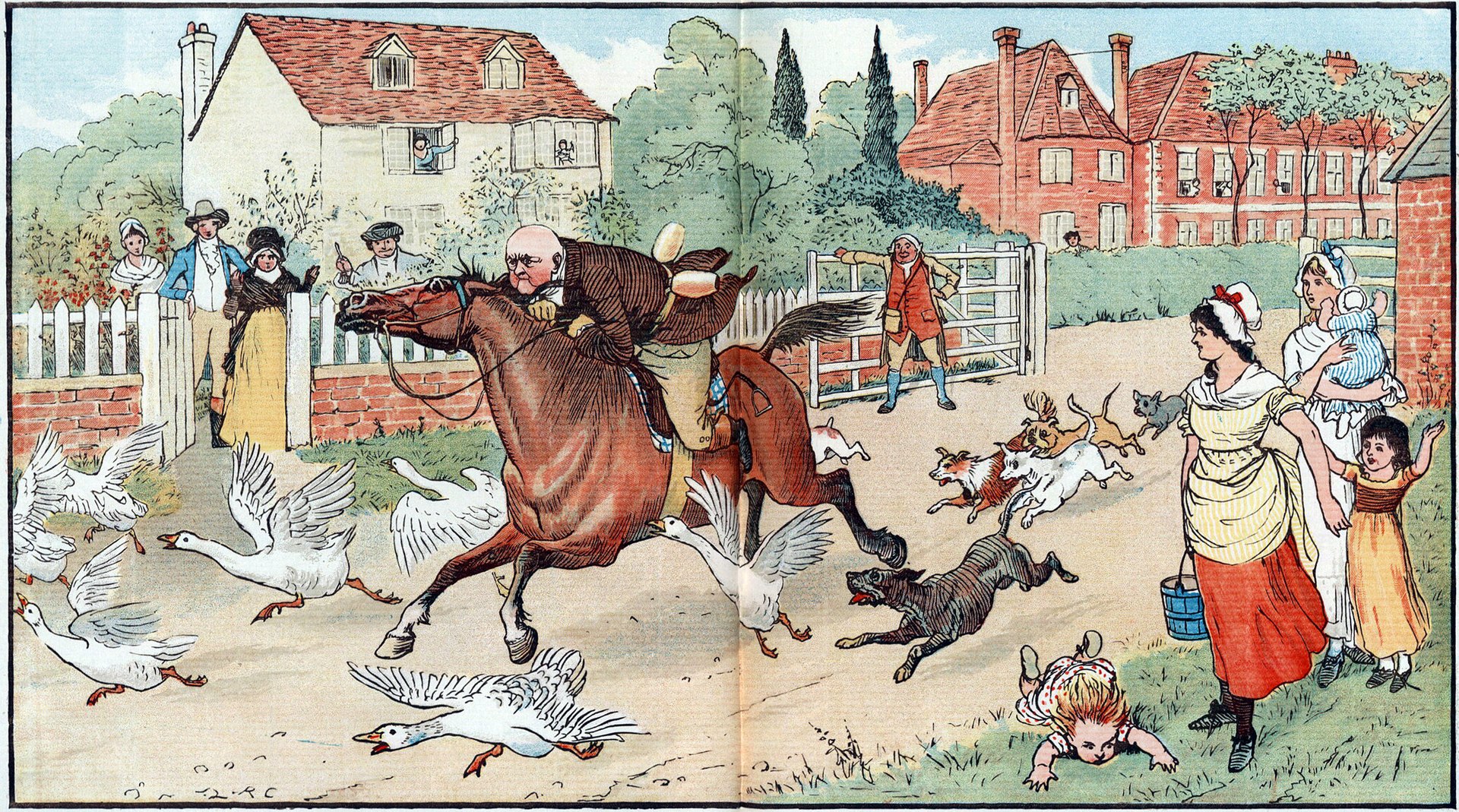“The Diverting History of John Gilpin” is a comic poem written by the English poet and hymn writer William Cowper (1731–1800), first published anonymously in the Public Advertiser in 1782 and subsequently under the title “The Task” in the same publication in 1785.[1]
The poem is based on the real-life story of a linen-draper named Beyer,[2] as told to Cowper by his friend Lady Austen.[1] For a time it was the “most popular poem in England”, due at least in part to the readings delivered by the acclaimed actor John Henderson, at Freemasons’ Hall in 1785.[3]
Poem
This is a condensed version, in which some verses are omitted; a link to the text of the full poem can be found at the end of this article.
John Gilpin was a citizen
Of credit and renown,
A train-band captain eke was he
Of famous London town.
John Gilpin's spouse said to her dear—
Though wedded we have been
These twice ten tedious years, yet we
No holiday have seen.
To-morrow is our wedding-day,
And we will then repair
Unto the Bell at Edmonton
All in a chaise and pair.
My sister, and my sister's child,
Myself, and children three,
Will fill the chaise; so you must ride
On horseback after we.
...
A train-band was a county-based militia formed by Queen Elizabeth I, largely replaced by a standing army during the 18th century;[4] “eke” tells us that Gilpin was frugal, as in eking out his resources, which perhaps explains why his wife considers their twenty years of marriage to have been “tedious”.
John Gilpin at his horse’s side Seized fast the flowing mane, And up he got, in haste to ride, But soon came down again;
So down he came; for loss of time, Although it grieved him sore, Yet loss of pence, full well he knew, Would trouble him much more.
As Gilpin is mounting his borrowed horse, he sees three customers entering his shop, so he goes back to serve them.
…
Now Mistress Gilpin (careful soul!) Had two stone bottles found, To hold the liquor that she loved, And keep it safe and sound.
As he is finally ready to leave, Gilpin realises that their wine has been left behind, so he loops the bottles around his belt and finally sets off.
…
But finding soon a smoother road Beneath his well-shod feet, The snorting beast began to trot, Which galled him in his seat. So, ‘Fair and softly,’ John he cried, But John he called in vain; That trot became a gallop soon, In spite of curb and rein. So stooping down as needs he must Who cannot sit upright, He grasped the mane with both his hands, And eke with all his might.
Gilpin sets out cautiously on the paved road, but as the path becomes smoother the horse gets faster and faster, until Gilpin is just hanging on, completely out of control.
…
The dogs did bark, the children screamed, Up flew the windows all; And every soul cried out, ‘Well done!’ As loud as he could bawl. Away went Gilpin—who but he? His fame soon spread around; ‘He carries weight! He rides a race!’ ‘’Tis for a thousand pound!’
Onlookers, seeing Gilpin galloping by with the wine bottles attached to his belt cheer him on, believing him to be in a race.
…
At Edmonton his loving wife From the balcony spied Her tender husband, wondering much To see how he did ride. ‘Stop, stop, John Gilpin!—Here’s the house!’ They all at once did cry; ‘The dinner waits, and we are tired;’— Said Gilpin—‘So am I!’
Gilpin’s bolting horse races past his waiting wife in Edmonton, on towards the house of its owner, further down the road in Ware.
…
‘But let me scrape the dirt away That hangs upon your face; And stop and eat, for well you may Be in a hungry case.’ Said John, ‘It is my wedding day, And all the world would stare, If wife should dine at Edmonton, And I should dine at Ware.’
Eventually the horse pulls up outside the house of Gilpin’s friend, who had lent him the animal. Seeing Gilpin’s disheveled state the friend offers him some hospitality, but Gilpin resolves that he must meet his wife at Edmonton without further delay, and sets off again on the horse.
…
And now the turnpike gates again Flew open in short space; The toll-men thinking, as before, That Gilpin rode a race. And so he did, and won it too, For he got first to town; Nor stopped till where he had got up He did again get down. Now let us sing, Long live the King! And Gilpin, long live he! And when he next doth ride abroad May I be there to see!
But the horse is once again spooked, this time by a braying ass, and bolts back to where it had started from, outside Gilpin’s shop, once again racing past Gilpin’s waiting wife in Edmonton.
External links
- Full text of the poem from Project Gutenberg.

